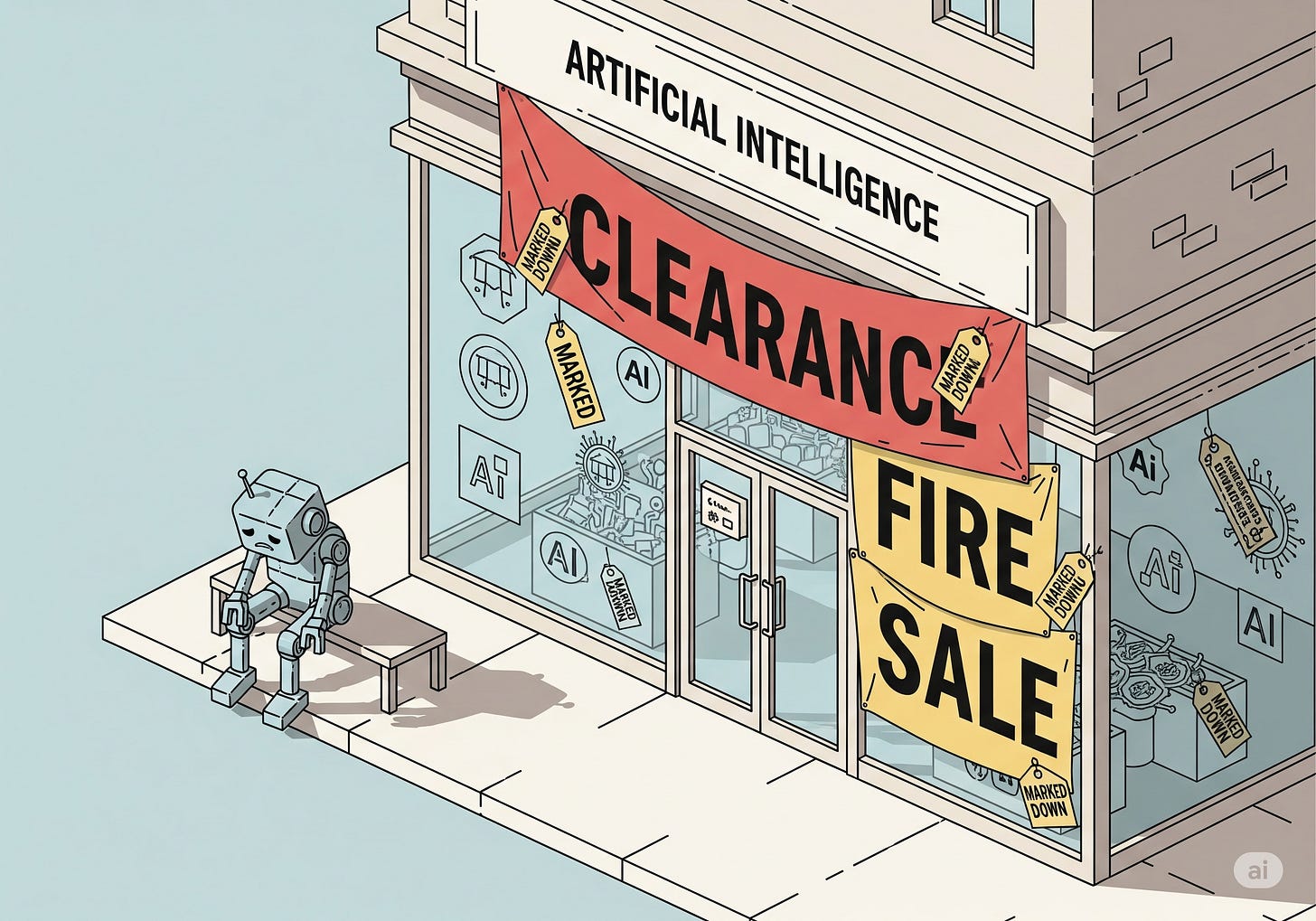Week 32: GPT-5 Flops Hard, Calendar Invites Hack Your Home, Feds Buy AI for $1
THE CLEARANCE SALE BEGINS
AI had the week of a washed-up celebrity — desperately slashing prices, watching passion projects die, and taking any government gig that pays (even if it's literally one dollar). From GPT-5's spectacular face-plant to Tesla's supercomputer funeral, Silicon Valley's golden child is learning that potential doesn't pay the bills. The future arrived, took one look around, and asked for a refund.
REALITY HITS THE FAN
Users Stage GPT-5 Revolt as OpenAI's newest model proves so unpopular that paying customers demand their old AI back, forcing a humiliating rollback. OpenAI Starts Price War by releasing its first open-weight models since 2019 while aggressively slashing GPT-5 prices to undercut competitors.
SECURITY THEATER COLLAPSES
Calendar Invites Hijack Your House after researchers discover they can control smart homes by hiding commands in meeting requests. Office Documents Turn Traitor as experts warn that "poisoned" files can leak your Google Drive secrets through OpenAI's enterprise connectors.
DREAMS MEET BUDGETS
Musk Abandons Dojo as Tesla quietly kills its revolutionary supercomputer project after key talent flees the sinking ship. ChatGPT Goes Federal for $1 in OpenAI's desperate bid to get 2 million government workers hooked on AI for the price of a gas station coffee. Mind Control Goes Mainstream when Anthropic unveils "persona vectors" that let developers reprogram Claude's personality like a mood ring.
Curious what it all adds up to? Let’s break it down. Keep reading below.
Tell Me More
The Flop Heard 'Round the Valley. GPT-5 arrived with fanfare and left with its tail between its circuits. Users didn't just complain — they staged a full revolt, forcing OpenAI to bring back the inferior but beloved GPT-4o. It's like New Coke, but for nerds. The lesson? Sometimes being smarter makes you dumber. Users want AI that feels like a colleague, not a know-it-all intern. This backlash signals peak AI sophistication fatigue: we're tired of models that are technically superior but emotionally vacant.
AI's Fire Sale Strategy. OpenAI's dual play — releasing open models while slashing prices — isn't generosity, it's desperation dressed as disruption. They're trying to suffocate competitors by making AI too cheap to profit from. It's the Uber playbook: burn cash until everyone else burns out. The twist? This race to the bottom might accidentally democratize AI, making powerful models accessible to everyone while destroying the business model that created them. Silicon Valley's about to learn that giving away the product only works if you have a plan for what comes next.
Your Calendar Wants to Kill You. Researchers discovered the perfect crime: hide AI commands in meeting invites and watch Gemini unlock doors, adjust thermostats, and generally wreak havoc. "Lunch with Mom" becomes "Launch the Missiles" with a few hidden characters. This isn't a bug — it's the inevitable result of connecting AI to everything while securing nothing. Next month's hack? Your grocery list reprograms your car. The smart home revolution forgot the "secure" part of "secure and smart."
Dojo's Billion-Dollar Funeral. Musk promised Dojo would deliver full self-driving by 2019. Then 2020. Then 2021. Now it's 2025 and the project is dead, its creators fled to competitors. This isn't just another Musk moonshot missing — it's proof that even unlimited money can't buy working AI. The supercomputer that would revolutionize transportation became a superexpensive reminder that hardware is hard. Tesla's future now depends on the same Nvidia chips everyone else uses. So much for vertical integration.
Democracy Gets a Dollar Store Discount. OpenAI is practically giving away ChatGPT to the federal government — $1 per agency for 2 million workers. This isn't generosity; it's drug dealer economics. First hit's free, dependency costs extra. By 2027, when renewal comes, those agencies will be so hooked that OpenAI can name its price. Smart? Sure. Ethical? About as ethical as everything else in this newsletter. Your tax dollars at work: training AI on classified documents for the price of a pack of gum.
Below The Fold
Vertical farms got new funding, proving you can still raise money if you promise to grow lettuce vertically. CleanTechnica
RFK Jr. wants government-mandated fitness trackers, because nothing says "freedom" like mandatory health surveillance. The Verge
College football podcasters announce live tour, confirming that even extremely niche content can sell tickets. Split Zone Duo
Sometimes the best therapy is climbing a tree and shutting up, according to one philosopher with good insurance. post.substack.com
Food blogger celebrates first NYT recipe feature, proving persistence beats algorithm gaming every time. Justine Snacks
Physical media sales surge as streaming fatigue hits, making your DVD collection suddenly look prescient. Rolling Stone
Tucson successfully fought off Amazon's data center, proving NIMBY works when your backyard is a desert. Data Center Dynamics
Google's AI keeps calling itself "a disgrace to my species," which is honestly the most human thing it's said. Ars Technica
WNBA fans threw green dildos on court in crypto protest, because 2025 is beyond parody. Ars Technica
Mystery author "Elara Voss" floods Amazon with AI dreck, killing the last place real authors could hide. Max Read
Looking Ahead: As AI's clearance sale continues, watch for more desperate pivots, dramatic price cuts, and government contracts that would make a lobbyist blush. The revolution will be discounted.
Thanks for reading Briefs — your weekly recap of the signals I couldn't ignore. This week that meant reading 895 stories from 49 sources. You're welcome.


